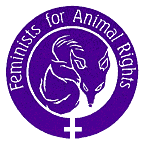animal
rights & the ecological crisis
Increasingly the
ecological crisis is being seen as more than a simple repair job. It
causes are diffuse and systemic, so that band-aid measures are doomed
to be ineffectual. The wholesale exploitation of nature, with little
regard to the future or the preservation of other species is being viewed
as consequent of the "grow or die" ideology of the free-market that
views everythign only in dollar terms. Capitalism thrives on the notion
of competion, and this engenders domination, exploitation and oppression.
As ecofeminist
Francoise d'Eubonne puts it, "…it is impossible, in a market system,
not to devastate the planet"
Environmental devastation
and animal exploitation often go hand in hand: trees are cleared for
pasture to run cattle, cattle contribute to greenhouse gas emissions
and their hard hooves impact on soil structure.
Often what is primarily
an economic incentive is painted with the brush of altruism: that intensive
and industrialised farming will increase the availablity of food in
a starving world. This is simply untrue. The conversion ratio of grain
to meat at 7:1 makes a mockery of this claim. Meat farming is the only
food production method that uses more energy than it returns in kilojules.
80% of the world's soybean crop goes to animal feed, depriving humans
of this inexpensive, high protein food source, to produce a lower protein
food that is only avialbale to the rich. The lucrative animal feed industry
gives added impetus to the chemical companies developing genetically
modified crops. These companies epitomise the crux of the capitalist
problem: they consider sole resposibility is to profit their shareholders,
so they are ecologically and socially irresponsible at many levels.
They create the products that contaminate our homes, food and the environment
and put human and non-human lives and health at risk; that put the genetic
makeup of wild life at risk; that allow them to influence goverments
to their advantage by virtue of the power wealth affords them; that
use coercive tactics which directly on indirect compel farmers to use
their products, and the consequent destruction of community throught
the end of the family farm as they become large scale agri-businesses.
Just as the ruthless
drive for survival in the economic paradigm drives Queensland Farmers
to strip their land of trees, so too it drives them to reduce their
animal 'chattels' to bio-machines. Farms have become factories for processing
animals. The value of the animal, as a locus of life and capable of
experience has to be ignored to survive in this system. As the dollar
input into agribusiness (in terms of antibiotics, chemicals, processed
feed, 'techical' fees for use of patented life forms) concession to
humane practice are sacrificed and animals become no more than "very
efficient converting machines" (from Farm and Stockbreeder Journal)
In their book Animal Factories 1984, Peter Singer and Jim Mason cite
a very telling quote from a farm mangement journal: "Forget the pig
as an animal. Treat him just like a machine in a factory. Schedule tretments
like you would lubrication for you car"
The commodification
of non-human life is of concern to both animal rights advocates and
environmentalists alike: for in rendering life as a mere profitable
resource, we render it morally irrelevant and without rights. Yet a
majority of Australians do value nature and believe that "wilderness
areas should be conserved for their won sake, not because people want
to use them" to turn a profit (WS study 1996). Likewise, the suffering
of non-human animals should not go unheeded, for if wilderness has value
outside of human benefit, so too do animals. If the property rights
of farmers that hitherto allowed them strip their land of trees has
now been questioned by the (yet to be inplemented) Vegetation Mangement
Act 1999, so too can the property rights over the sentient anials they
exploit for money. Both forms of dominatin rely on an unjustifiable
ideology, a hierarchy where profit is master. Given the bad effect meat-farming
has on the environment, it's contribution to non-human suffering and
it proven detriment to human health, non-participation is obligatory
to recognising that life other than human is deserving of rights. Opting
out of meat-eating is opting out of the system of domination that allows
it to occur.
Kim Stewart
Animal Liberation
Qld
November 2000
*for more articles
return to the 'activist tools' section

